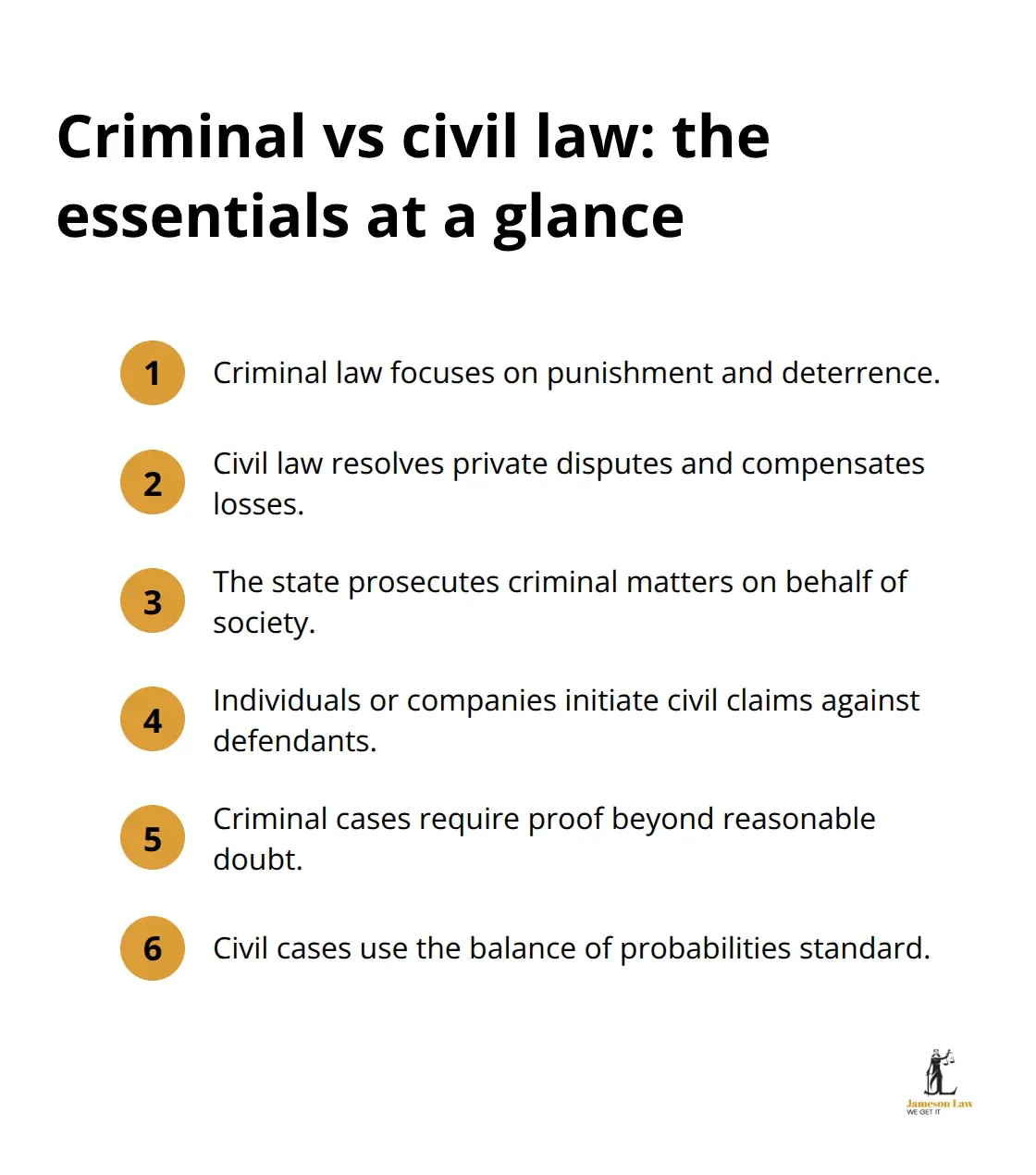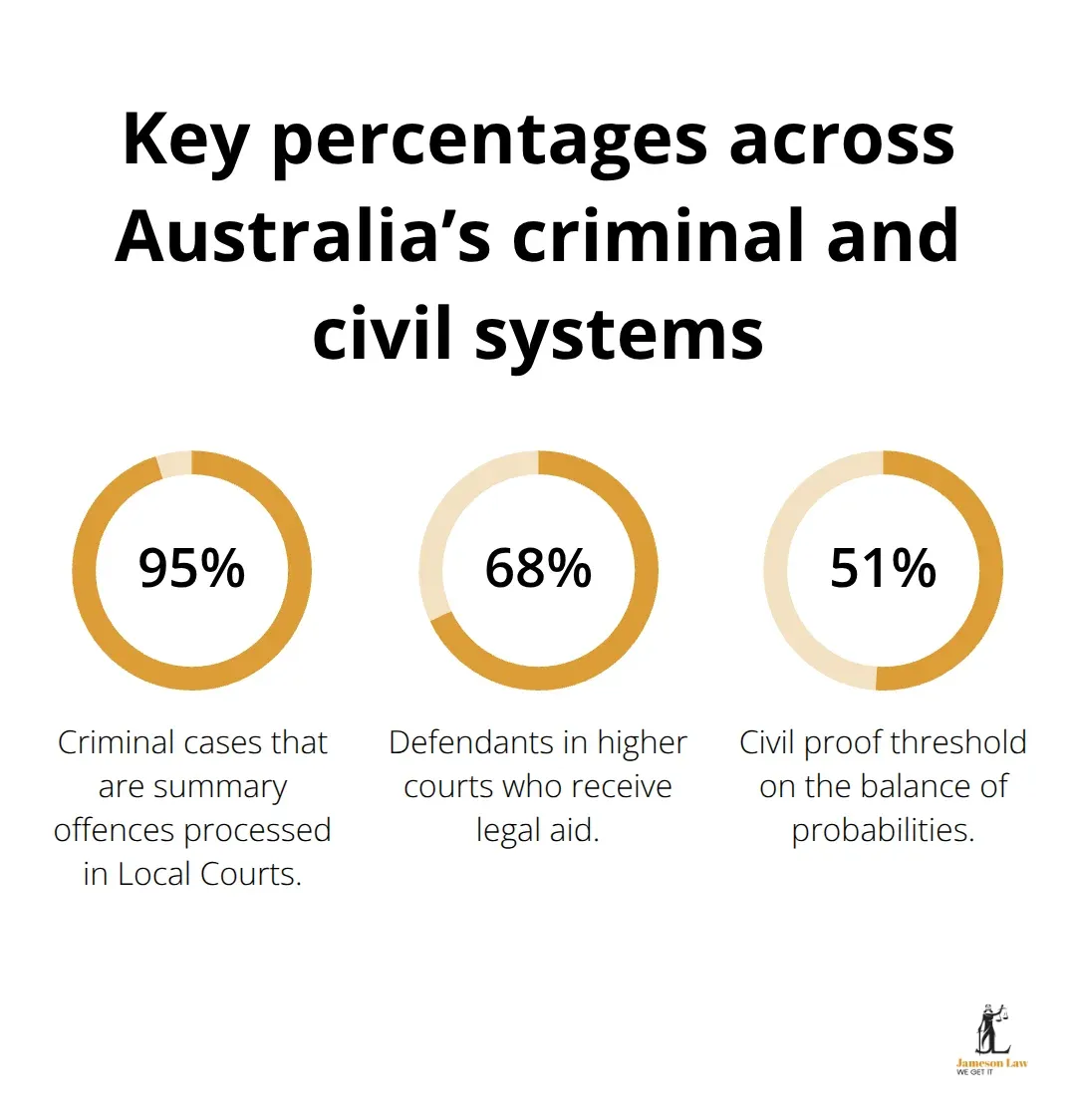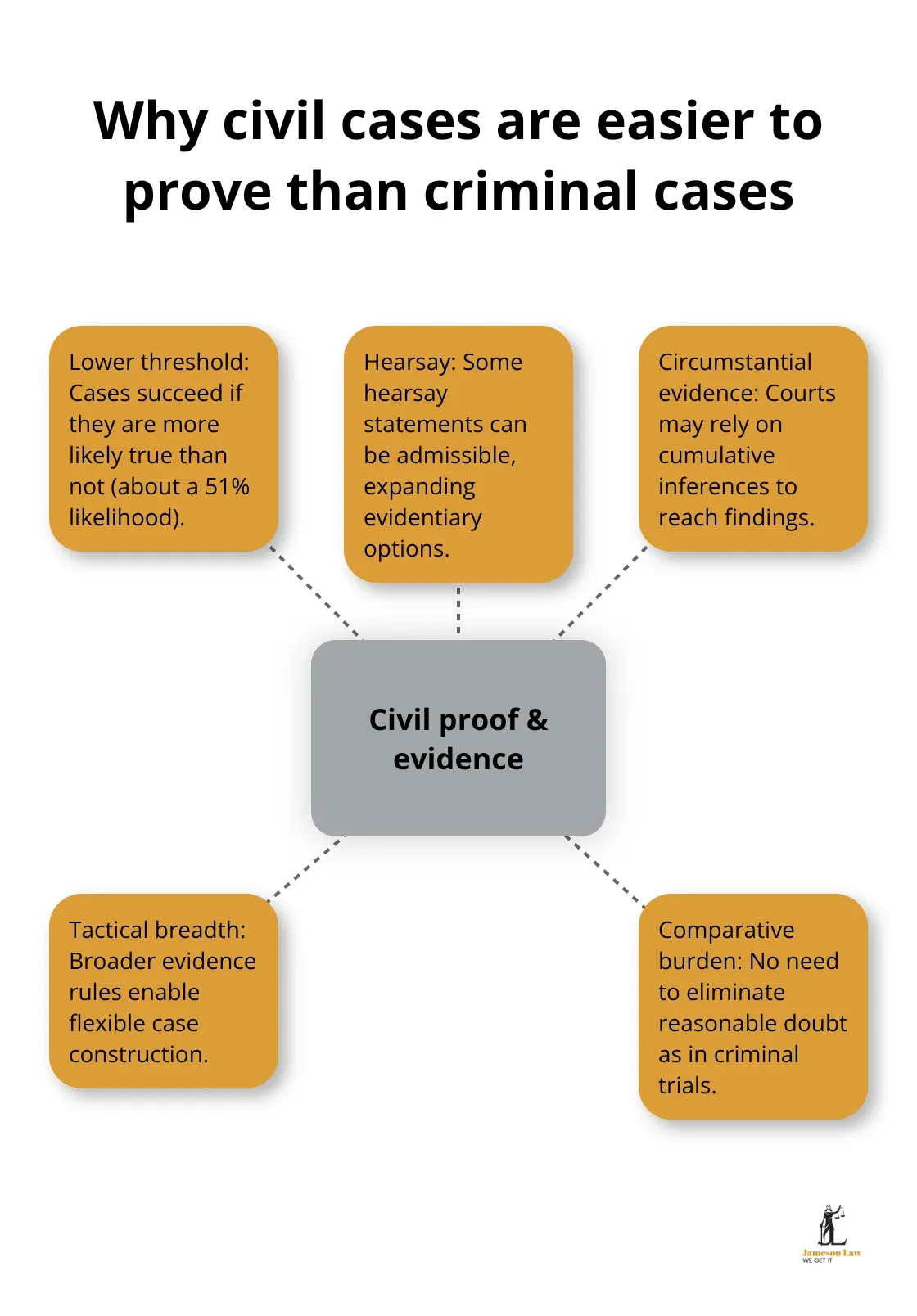Australia’s legal system operates through two distinct branches that serve different purposes and follow unique procedures. Understanding the criminal and civil law difference helps you navigate legal matters more effectively.
We at Jameson Law regularly guide clients through both systems, and the distinctions matter significantly for your case outcome. This guide breaks down the key differences between these legal frameworks.
What Sets Criminal and Civil Law Apart
Purpose and Objectives Drive Different Outcomes
Criminal law protects society by punishing wrongdoers and deterring future crimes. The Australian Bureau of Statistics reports that 2.1 million criminal cases were processed through Australian courts in 2021-22, with the state pursuing punishment through fines, imprisonment, or community orders.
Civil law serves a completely different function – it resolves disputes between private parties and provides compensation for harm or losses. The NSW Civil and Administrative Tribunal alone handled over 85,000 civil matters in 2022-23, focusing on restoration rather than punishment.

Case Types Reveal the Core Distinction
Criminal cases encompass offences against society including assault, theft, drug trafficking, and murder. Summary offences carry maximum penalties of two years’ imprisonment and are heard in Local Courts, while indictable offences like armed robbery or sexual assault face higher courts with severe penalties.
Civil disputes cover contract breaches, personal injury claims, family law matters, defamation cases, and property disagreements. Personal injury claims represented a significant portion of civil litigation in NSW District Courts, with motor vehicle accidents accounting for the largest portion. The Australian Competition and Consumer Commission received over 235,000 consumer complaints in 2022-23 (many resulted in civil proceedings).
Parties and Representation Shape the Process
Criminal prosecutions involve the state versus the accused, with the Director of Public Prosecutions or police representing society’s interests. The accused faces potential criminal records, imprisonment, or substantial fines.
Civil proceedings pit plaintiff against defendant, with individuals or companies seeking monetary damages or court orders. Legal costs in civil cases typically follow the event – meaning the losing party pays the winner’s legal fees, creating significant financial stakes. Criminal defendants receive legal aid for serious charges, while civil litigants often arrange No Win No Fee agreements for personal injury claims.
These fundamental differences in purpose, case types, and parties establish the foundation for understanding how each system operates. The next aspect to examine is how criminal law functions specifically within Australia’s legal framework.
How Does Criminal Law Work in Australia
Criminal Offence Categories and Prosecution Standards
Australian criminal law classifies offences into three distinct categories that determine court jurisdiction and potential penalties. Summary offences include traffic violations, minor assault, and theft under $5,000, with Local Courts handling these cases and imposing maximum sentences of two years. Indictable offences encompass serious crimes like armed robbery, sexual assault, and drug trafficking, proceeding to District or Supreme Courts with penalties exceeding two years’ imprisonment. Strictly indictable offences represent the most severe crimes including murder, manslaughter, and treason, requiring mandatory trials in Supreme Courts with potential life sentences.
The Australian Institute of Criminology data shows that 95% of criminal cases are summary offences processed through Local Courts, making these the most common criminal proceedings. Police must establish a prima facie case before they charge suspects, meaning sufficient evidence exists to support prosecution. The Evidence Act 1995 governs admissibility standards, requiring police to follow strict procedures for witness statements, forensic evidence, and suspect interviews to prevent case dismissals.

State Prosecution Powers and Defendant Rights
The Director of Public Prosecutions represents the state in serious criminal matters, wielding significant resources (including forensic laboratories, expert witnesses, and specialised prosecutors). Police initiate proceedings through Court Attendance Notices or arrests, with the state bearing full responsibility for proving guilt beyond reasonable doubt. This standard means prosecutors must eliminate any reasonable possibility of innocence, creating a high evidentiary threshold that protects defendants from wrongful convictions.
Defendants possess fundamental rights including the right to silence, legal representation, and jury trials for indictable offences. The Australian Bureau of Statistics reports that 68% of defendants in higher courts receive legal aid, while others arrange private representation or self-represent. Police interviews require caution administration, and suspects can request lawyers before questioning, preventing coercive interrogation tactics that might compromise case integrity.
Conviction Consequences and Criminal Records
Criminal convictions create permanent records affecting employment, travel, and professional licensing opportunities. The Australian Criminal Intelligence Commission maintains national criminal databases, with serious convictions remaining accessible to employers and government agencies indefinitely. First-time offenders for minor offences may receive conditional release orders or community service, while repeat offenders face escalating penalties including imprisonment terms.
Financial penalties range from $110 fines for minor traffic offences to $1.1 million for serious corporate crimes under Commonwealth legislation. Imprisonment rates in Australia average 170 per 100,000 population according to the Australian Bureau of Statistics, with violent offences receiving average sentences of 3.2 years. Conviction appeals must be lodged within 28 days, requiring fresh evidence or procedural errors to succeed in overturning lower court decisions (appeals face strict time limits and high success thresholds).
While criminal law focuses on punishment and deterrence through state prosecution, civil law operates under completely different principles and procedures that prioritise compensation over punishment.
How Does Civil Law Operate in Australia
Private Disputes Follow Different Rules Than Criminal Cases
Civil law operates through private parties who seek financial compensation or court orders to resolve disputes. The NSW Civil and Administrative Tribunal processes matters annually while District Courts handle higher-value claims that exceed $100,000. The plaintiff initiates proceedings through a Statement of Claim, which outlines their case and demands specific remedies such as monetary damages, injunctions to stop harmful conduct, or orders for specific performance of contractual obligations.
Lower Proof Standards Create Strategic Advantages
The burden of proof in civil cases requires only balance of probabilities rather than beyond reasonable doubt. This means plaintiffs must show their claim is more likely true than false. This 51% threshold makes civil success significantly easier than criminal convictions. Evidence rules permit hearsay statements and circumstantial evidence that criminal courts might exclude, which gives civil lawyers broader tactical options for case construction.

Financial Stakes Drive Settlement Strategies
Civil litigation operates on a costs follow the event principle, where parties who lose pay winners’ legal fees. This creates powerful settlement incentives, with most civil disputes resolving through negotiation or mediation before trial. Successful plaintiffs receive compensation for economic losses, pain and suffering, and future care costs, with interest that accrues on judgments until payment completion.
The financial dynamics of civil law create different strategic considerations than criminal proceedings, particularly when defendants face potential bankruptcy from adverse judgments while plaintiffs risk substantial legal cost orders if their cases fail.
Final Thoughts
The criminal and civil law difference shapes every aspect of how Australian courts handle legal matters. Criminal law protects society through state prosecution, requires proof beyond reasonable doubt, and imposes penalties like imprisonment or fines. Civil law resolves private disputes through compensation, operates on the balance of probabilities standard, and provides financial remedies.
These distinctions affect your legal strategy significantly. Criminal cases carry permanent records and potential imprisonment, while civil matters focus on monetary damages and court orders. The burden of proof, parties involved, and available remedies differ completely between systems (making professional guidance essential for success).
We at Jameson Law provide expert representation across both criminal and civil matters throughout Australia. Our team helps clients achieve the best possible outcomes in complex legal situations. Contact us today for experienced legal guidance tailored to your specific case requirements.













